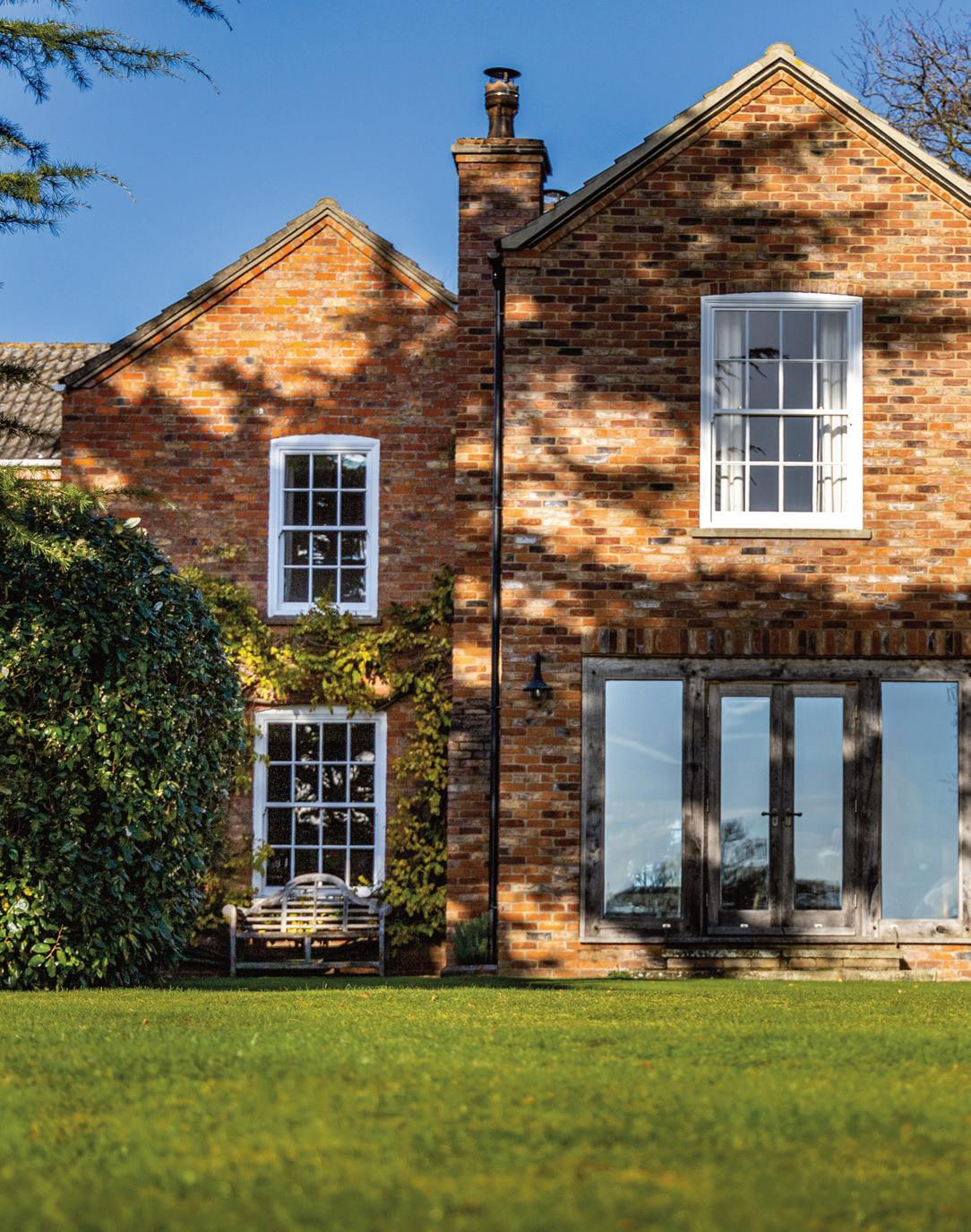
11 minute read
via food delivery service Yummy
Lift Your SPIRIT
If you’re looking for something to lift your spirit this winter, Bandsman and Bandmaster will be music to your ears. The creation of Lincoln’s James Wood, this sublime duo of gins feature a range of botanicals that are perfectly in tune with what an aficionado loves…
Advertisement
Words: Rob Davis.
COMEDY and the creation of a really good tipple have something in common: timing. During our visit, James Wood’s chubby stainless-steel vessel, Bertha, is currently full of 1,000 litres of some of the finest gin you’re ever likely enjoy. But not yet.
First, it has to rest for about a month to let the botanicals really stretch their legs and pervade perfuse and permeate the neutral grain spirit in which they rest. It’s time well invested, unlike three years spent at university, it seems.
Speaking of comedy, James was given an irritatingly trenchant, though slightly amusing, lesson about crap timing when he completed his degree in European Studies in 2016 – hoping to pursue a career in the civil service – just before the country experienced collective delirium and decided to vote for Brexit.
Bang goes that career, so all that was left was to clear off down the pub. So he did.
And whilst there, enjoying a gin and tonic with his old University chum, contemplating alternative careers, James deduced that his ideal career was to create a product, one that he could be proud of, one that people could enjoy. Something like…
“Trial and error,” says James. “I enjoy spirits, rather than real ale or wine, and though I like whisky, that’s a product which typically takes five to eight years in casks to mature. A vodka or gin-based product could be brought to market faster and gin is a spirit that provides the potential for great versatility.”
“There are many flavoured gins on the market, some of which work better than others. Gin, I knew, would provide creative scope after I’d mastered the mastery of an ability to produce a really good halo product on which to base future products.”
James’s trial and error saw him experimenting with different flavours and gradually developing a canny sense of what will and won’t work in the context of his method of gin production, known as compounding.
His eureka moment came with the hunch that the oleic qualities of tomato and basil would work well alongside a few other botanicals. >>
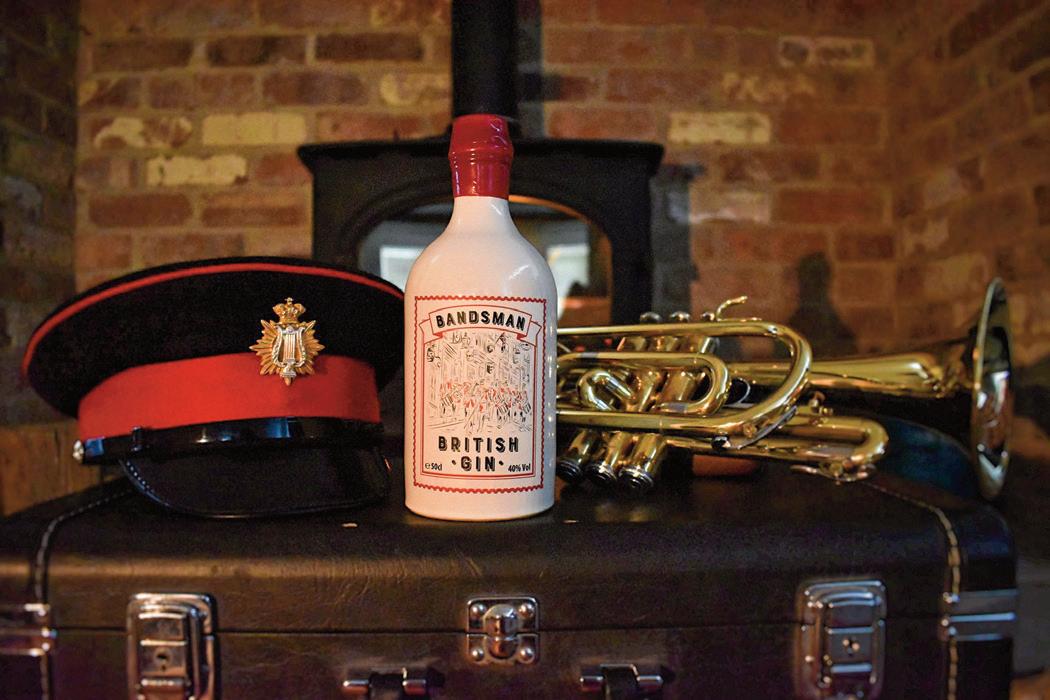
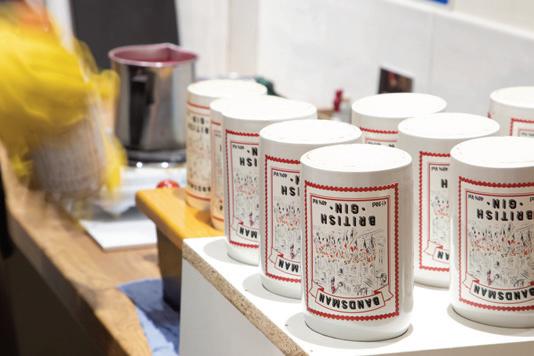
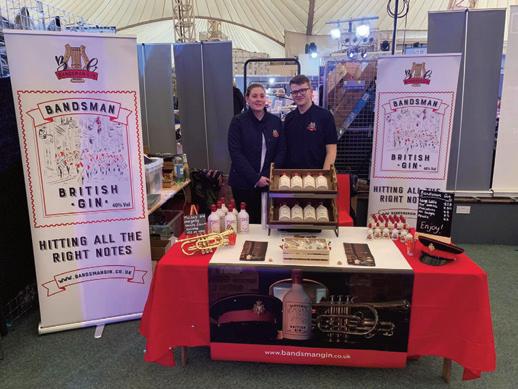
>> The first of his two ‘halo product’ gins – Bandsman – was born, with a second product, Bandsmaster, following a little later. At this point, it’d be a good idea to take a short digression to consider the science of gin production.
Broadly speaking, there are two ways to make gin. The first is the creation of compound gin, which was always known colloquially as bathtub gin, inspired in part by the prohibition era.
Here, 97% proof grain neutral (i.e.: flavour inert) spirit is combined with distilled water to ensure its eventual potency remains at the preferred 40% ABV.
Flavouring ingredients – the botanicals – are placed in a sterilised hessian sack and soak in the spirit for anywhere from 48-hours to a month. It’s a sort of steeping process, the longer the better.
Thereafter it’s filtered twice before James uses a vacuum filling process to fill his bottles before corking them and dunking them in hot wax to create his trademark seal.
An alternative method of gin production is the London Dry Gin method, whereby spirit is added to the still and boiled with water to stabilise it. The botanicals are located above the boiling vessel and infuse the steam that rises. The ‘alcoholic steam’ is then condensed and collected as the final product.
James’s Bandsman Gin is made using the compound method. Whilst it utilises tomato, basil and elderflower, its flavour profile isn’t one which explicitly reflects the botanicals, but it does have a sort of sweet, creamy flavour, and once you’re aware of exactly what botanicals have been used, you’ll probably nod in acknowledgement of their faintest presence.
Meanwhile, James’s newer Bandsmaster gin is made using his copper still and utilises the London Dry method just like the mainstream gins you’ll know; Gordon’s, Sipsmith and Beefeeter. With its crisp herbaceous flavour profile, it’s more likely to appeal to those seeking a traditional gin to enjoy with tonic. During our visit, James was just bottling the first of his special edition gin, Caroller’s Reserve, a winter edition which uses Bandmaster (i.e.: a London Dry-style gin) as its base with sloes and damsons, plus honey to sweeten it as a natural alternative to refined sugar. Ostensibly a Christmas gin, the limited run of bottles is likely to remain available as Pride goes to press and into February, but if you’d like to secure ownership of one of the remaining bottles in this first batch, we’d suggest you make contact with James tout de suite.
“I really love the creative scope that producing spirits provides,” says James. “I’ve called the company Gentlemen Distillers rather than naming it Bandsman, because it’s my hope to eventually diversify into providing whisky and vodka-based spirits, and perhaps wine or beer.”
“For the same reason I’ve not branded Bandsman or Bandmaster specifically for Lincolnshire. There are already some great gins produced by Pin Gin – Bottomley Distillers – based in Louth and the Lincoln Distillery in Saxilby. Both companies are run by really excellent people and I didn’t want to tread on their toes, but it’s my intention to broaden the reach of our two gins and to take them out of the county. I’m also hoping to work with one or both companies to collectively host a Lincoln Drinks Festival in 2021 or 2022.”
“I’m a keen brass bander and play the tuba, whilst my fiancée Shelby plays the Euphonium. I’m a member of the Lincolnshire
Fire & Rescue Band and the Newark and Sherwood Concert Band, so whilst playing around with branding ideas
I realised that would give us a great identity.”
“There are a number of craft beers already attributed to brass or concert bands, but there we no craft gin products, and the response and support we’ve had from the musical community already has been lovely.”
“We first released Bandsman in July 2019 so we’ve yet to have a year of trading in normal conditions, but I’ve been delighted by the response of the farm shops and bars that have taken on the product. I have a sort of ‘secret shopper’ role when I’m out, ordering my own product to see how it’s served. Happily I’m never disappointed.”
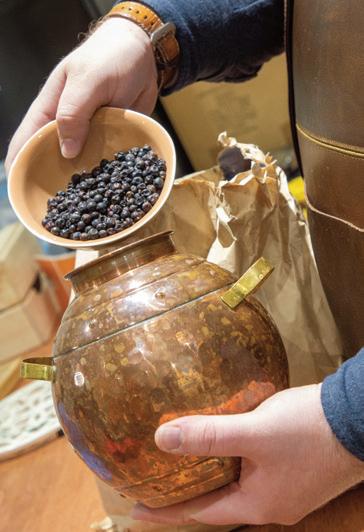
“One of the nicest things about Bandsman and Bandmaster is that they can be enjoyed however you wish. It’s also an important characteristic if they’re to be our halo products on which future releases are based. There’s a lot of nonsense spoken about which gins you should and shouldn’t pair with particular tonics, and a rather too healthy market for very expensive tonics, some of which have their own flavours which will end up being more – or less – compatible with the gin they accompany.”
“Our gin, meanwhile, can be served very nicely with ordinary Schweppes tonic or enjoyed just over ice or however you wish. We don’t prescribe how someone should consume it… we’re just happy that they do so, and that they really enjoy it!”
n The Gentleman Distillers is based in central Lincoln and its flagship gins, Bandsman and Bandmaster London Dry Gin, can be found in farm shops across the county or purchased online, direct from the company’s website. See www.bandsmangin.co.uk or call 01522 695 893.
SAVING LIVES ONE DISH AT A TIME
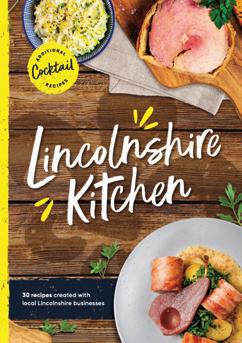
Darren Rogan’s Poacher Cheese Soufflé

Preparation Time: 20 minutes. Cooking Time: 30 minutes. Makes Four. 30g Lincolnshire Poacher butter, 35g flour, 150ml milk, 70g Lincolnshire Poacher cheese (grated), 2 eggs, 1 tsp English mustard, Salt & pepper
1. Heat oven to 190°c and place a baking tray, filled with 1cm of water, on the middle shelf. Butter four dariole moulds in preparation for the bain marie.
2. In a pan, melt the butter over medium heat; stir in the flour. Cook, stirring, for one minute. Take off the heat and gradually stir in the milk, mixing it in thoroughly before adding more. Return to the heat and stir continuously until thick (around five minutes).
3. Crack the eggs, placing the whites into a bowl and stirring the yolks into the sauce. Stir in the cheese and mustard, season well. Transfer to a bowl and allow to cool.
4. Use a whisk to beat the egg whites until peaks form that just hold their shape (electric will make the job much quicker). Gently stir the whipped whites into the white sauce in a figure of eight.
5. Spoon the mixture into the dish. Run a cutlery knife around the edge to create a ‘top hat’ effect; this ensures the soufflé rises above the rim and doesn’t stick.
6. Place on a baking sheet and bake for 15–20 minutes until the top is golden and risen and has a slight wobble. Leave to cool and turn out of moulds. When ready to eat, bake on a lined baking tray for 10 minutes. n
Find Out More: Lincolnshire’s Emergency First Response charity, LIVES, has partnered with local chef Darren Rogan to create a new 50-page cookbook, The Lincolnshire Kitchen, celebrating some of our best suppliers, our best produce... and of course, the heroes who help to attend over 14,000 incidents a year, ensuring casualties receive treatment when they desperately need it... it’s just £9.99, and to obtain your copy, all you have to do is call 01507 525999 or visit www.lives.org.uk/lincolnshire-kitchen-book.

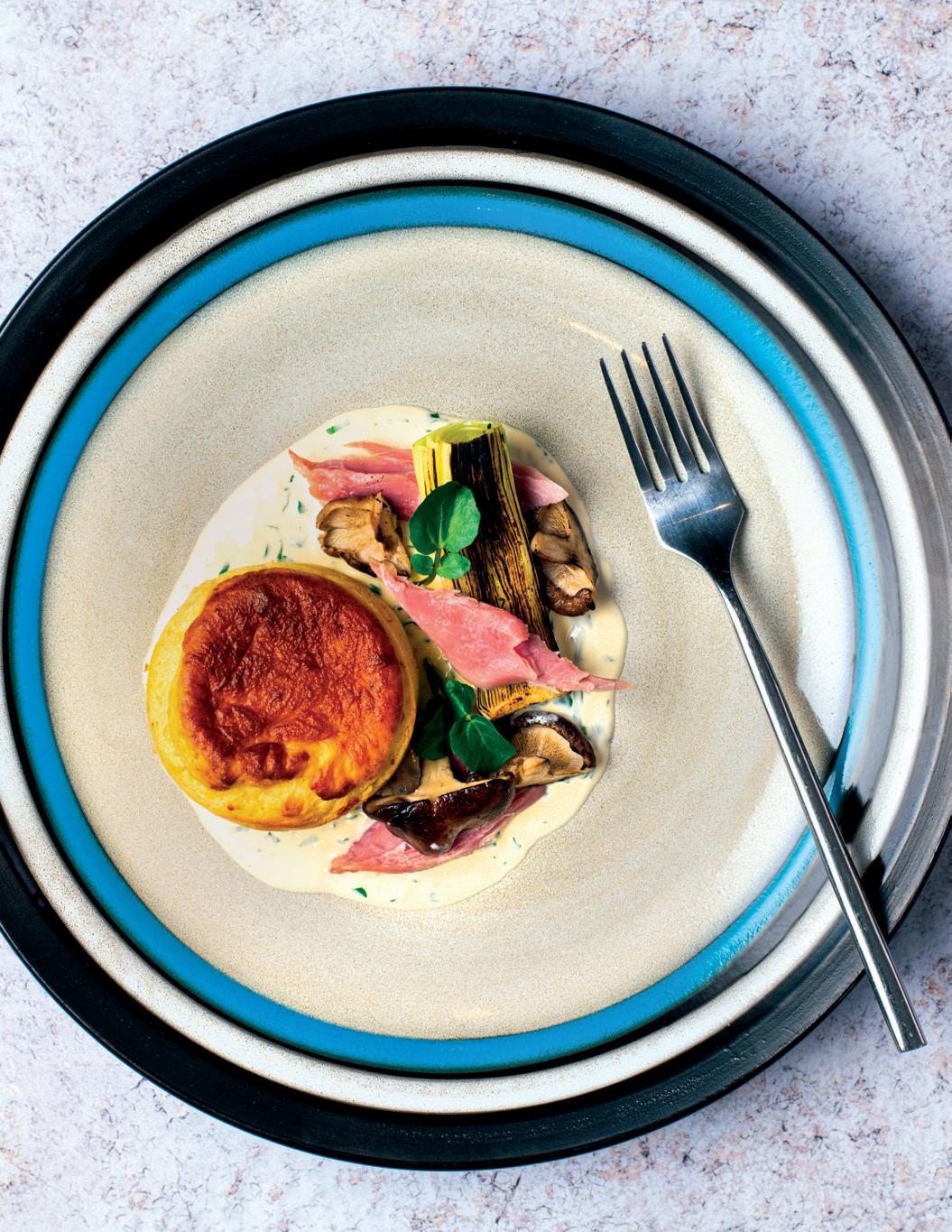
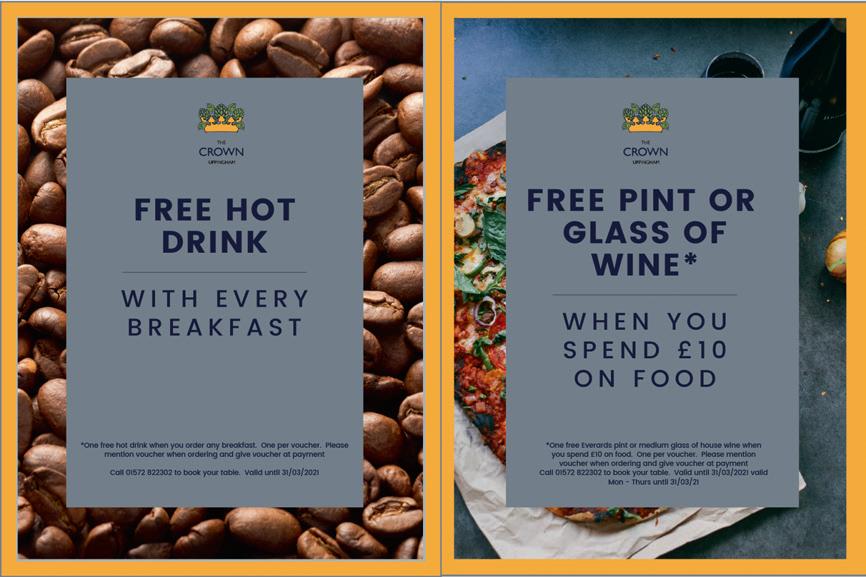
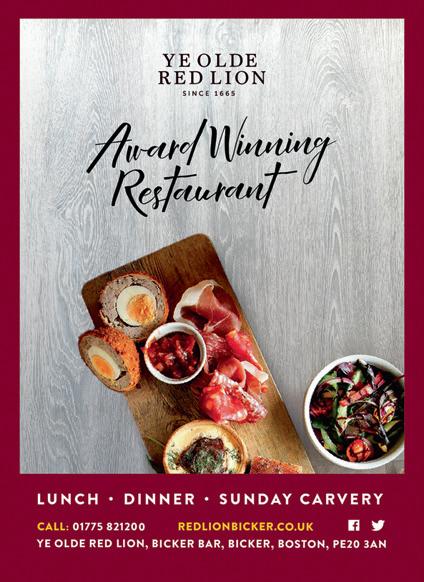





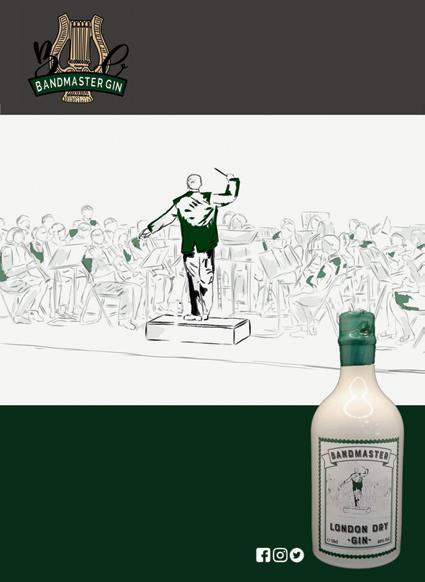
A local whisky that even Robert Burns would be proud of!

What do the English know about producing good whisky? Apparently quite a bit. This month we’ve a local Sassenach superstar that pioneers a ‘rapid aged’ technique... Lincoln’s Unconventional Distillery takes a virgin whisky spirit, and with a carefully calculated combination of heat, sound, light, some secret ingredients and a little magic, transformed it into blended whiskey, that even connoisseurs would think has been resting in an oak barrel for years. www.unconventional distillery.co.uk
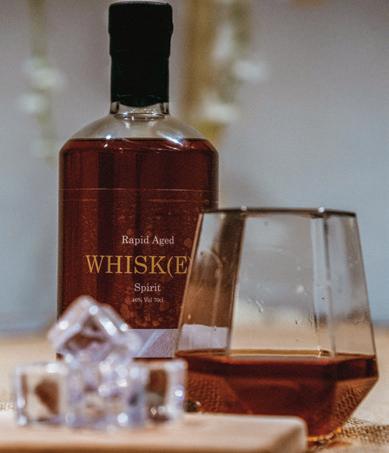
The Wine Cellar
Wine of the Month
Château Calon Ségur, Bordeaux, France, 2011 £70 / 75cl / 13% ABV
For a belting Bordeaux to enjoy by the fire, we’ll reach for this rock ‘n’ roll superstar, with its full body, and its Cabernet Sauvignon and Merlot blend of grapes. Calon Ségur harvested only 50% of the normal crop this year. Taut and pure, with lovely fresh acidity, this is an interesting wine with an intense blackcurrant character and some savoury and floral notes adding complexity. This Grand Cru Classic has a dense ruby purple colour, sweet cassis and lots of spice. Available from Waitrose Cellar, www.waitrose cellar.com.
THIS MONTH WE’VE A TRIO OF LIGHT AND LOVELY ROSÉ WINES PLUS A RAPID-AGED LOCAL WHISKY FOR BURN’S NIGHT AND A BELTING BORDEAUX TO ENJOY BY THE FIRE...
LA VIE EN ROSÉ: Romantic rosés for those enjoying the first flush of blush...
Enjoy a Bit of Covert Surveillance

1. Chêne Bleu is a beautiful Rhône wine combining Syrah and Grenache grapes to create a raspberry-scented wine with grapefruit and floral hints plus long citrus notes to finish. £22.99 / 75cl / 13% ABV.

2. From our very own shores comes the idyllic-sounding Bluebell Vineyards’ Hindleap Rosé. Exceptionally dry, with strawberries, rose and cranberries on the palate and peach on the nose, plus a gentle fizzy mousse. £27.99 / 75cl / 11.5% ABV.

3. Lively, dry and bright with pink grapefruit, and complex finish, Domaines Ott’s Rosé Château Romassan is a super premium rosé option £34.99 / 75cl / 13% ABV. If this isn’t a winter warmer we don’t know what is! Covert Liqueur is a sort of hybrid mead and cognac with fig leaves, and honey... a proper taste of medieval England! You can enjoy it as an alternative to dessert wine, in place of cognac, or over ice in front of the fire with the dog at your feet. Flavour-wise, think honey, floral tones, and walnut... it’s absolutely delicious! £37 / 70cl / 33% ABV.

n Our featured wines are available from the best local independent wine merchants, supermarkets and online, prices are RRP and may vary from those stated.
